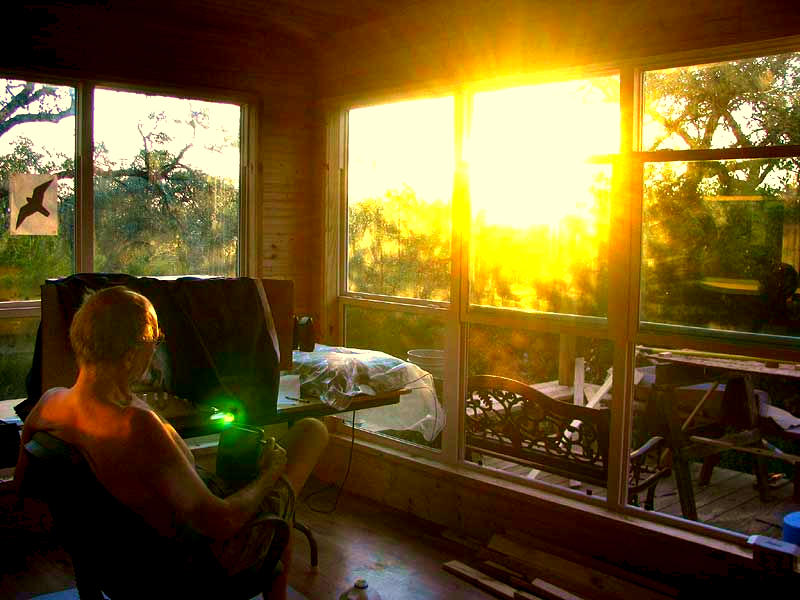
An Excerpt from Jim Conrad's
NATURALIST NEWSLETTER
of
September 8, 2013
Issued from the valley of the Dry Frio River in northern Uvalde County, southwestern Texas, on the southern border of the Edwards Plateau, USA

Above you can see where nowadays I write these Newsletters.
That picture was taken at dawn as the sun rose above the hills across the Dry Frio Valley. During breakfast I'm listening to Public Radio's news program. The clutter on the deck and floor is from trim work being done inside. Behind the black cloth covering the cardboard box beside me is where I keep the laptop, because with windows all around there's so much light I can't see the computer screen unless it's shaded. The glowing, green object above my mug is an optical artifact from photographing into the sun. I set the camera on a ten-second delay, then hurried to sit and look as if I'd been sitting there all morning.
The staticky, fading-in-and-out radio signal from San Antonio issues from the east exactly where the sun rises. With Mexico's vast Chihuahuan Desert at my back a couple of counties to the west, in my mind's eye I see beyond San Antonio the Mississippi River and my old hermit camp, Kentucky and the childhood home, the Appalachians, the Atlantic I used to fly over so often, Europe and beyond. Especially as I listen to the world news, the entire eastern horizon seems to shimmer with memories and teachings. Of course, I'm not seeing things as they are now, but as they were when I was there.
In Juniper House, morning sunrises are powerful -- so much light, such a broad view, time to think and remember, the air through the windows cool and fresh, patterns of the liveoaks' gnarly limbs always seeming on the verge of saying something important.
After the morning's physical labor I sit at the same spot working the rest of the day at the computer. By then it's hot, my skin red and wet from sweat. There's a ceiling fan where I sit but I don't use it, preferring the more casual, random breezes wafting through the windows. These little breezes surprise and delight with their brief gifts of coolness, and that occasional surprise and delight is more important to me than a constant, characterless, energy-consuming fan-cooling. All afternoon, the windows' little breezes mingle with the pleasure of identifying plants and animals, and writing about them.
Sometimes in late afternoons gorgeous thunderheads form toward the east where earlier the sun rose. In this arid land you can see the whole thunderhead from its dark, slate-gray base almost touching the horizon to its towering, dazzlingly white head maybe a hundred miles away. In the humid East such distant thunderheads remain hidden in haze but here their full disposition is clear, and it's hard to take your eyes off them as they mature and draw closer, and closer.
If they hit here, first the dark, scrub-covered hills across the valley disappear behind a sky-high white veil, then you hear rain in the valley, and then the valley disappears as raindrops streak the windows you're closing. Even with the windows shut you smell the rain and the electrical charge in it, and hear it on the metal roof. If there's lightning, it's spectacular in this room with big windows all around, sometimes almost scary.
The clouds dissipate soon after dusk and the stars shine. I sleep on the floor, with stars visible all around. When there's a full moon, it rises at dusk where the sun rises in the morning, and moonshine fills the room with transfixing brilliance and clarity. All night the room glows inside like something living, something more than just glass, metal and wood, something with its own moods and feelings. On full-moon nights I awaken a dozen times and have the most unlikely, irrational dreams.
But, I can't say that the dreams are any more bewildering or inspiring than being in the room during the day.
In fact, if I could give advice to humanity in the hope that what I said might save things, maybe something I'd suggest would be for everyone to make sure they surround themselves with plenty of windows, and that they're open windows, with long views. .